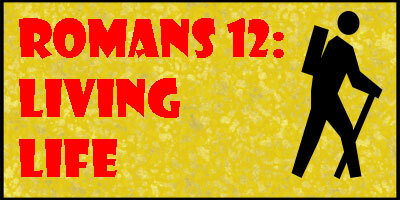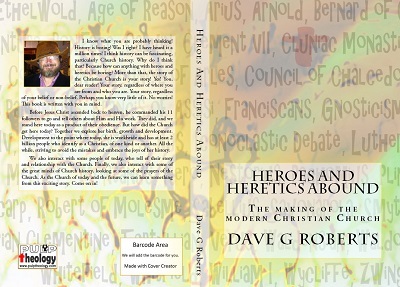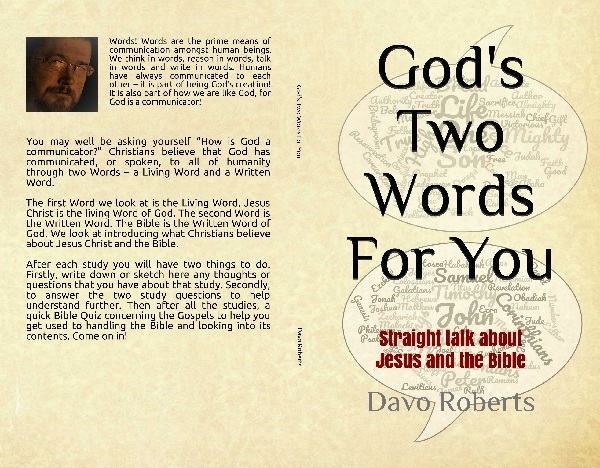
431.7K
Downloads
3368
Episodes
G’day and welcome to Partakers Christian Podcasts! Join us for uplifting Bible teaching, inspiring readings, heartfelt worship, powerful prayers, and fascinating church history. Whether you’re new to faith or growing deeper in your journey, we’re here to encourage and equip you. 🎧 Tune in, interact, and be inspired—wherever you are in the world.
Episodes

Sunday Sep 03, 2023
Romans 12 - Living Life - Part 03
Sunday Sep 03, 2023
Sunday Sep 03, 2023

Romans 12: Living Life
Study 03: Worship and service
Romans 12:1 And so, dear brothers and sisters, I plead with you to give your bodies to God because of all he has done for you. Let them be a living and holy sacrifice—the kind he will find acceptable. This is truly the way to worship him.
Here in this first verse of chapter 12, of that magnificent letter of Romans in the New Testament section of the Bible. As they are now Christians, their old life and old bodies have gone! That is what the letter writer Paul has been leading up to and saying. Paul, that great Apostle of the early church, now starts to elucidate about living life for God and for God alone. As Christians they have a new life and new bodies! Paul exhorts these followers of Jesus to worship Him with their whole bodies – not just their minds or their hearts! This is the new transformed person as living sacrifices in response to God’s mercy, justice, grace and love! Jesus sacrificially died for the person, so the person must also sacrifice their old ways of life – thoughts, desires, attitudes and actions – and proceed to live a whole life which is pleasing to God – pleasing in their thoughts, desires, attitudes and actions…
Why? Because that is part of whole life worship of Jesus, the Son of God. Because the whole body of the individual Christian is, in the point of view of God, been declared holy through the death of the Son Jesus Christ on the cross.
As Christians, we are to worship with our whole bodies and minds. As Christians we have been marked and sealed with the Holy Spirit who lives within the Christian –helping, counselling, consoling, comforting and empowering. It is not just worship, but also to be our service of God. Jesus, the Son of God, was the servant of humanity. It is our responsive worship to therefore be of service to God in all things that we do, as we go about our daily lives – work, rest and play.
If you are struggling in some area of life, encumbered with a perpetual sin, then confess to God that sin, ask Him to cleanse you afresh and to fill you with His Spirit. Keep on being filling with His Spirit. Not just on Sundays but every day of the week and in all areas of your life! By being filled with the Spirit, I mean be controlled by the Spirit and let Him guide your thoughts and actions. If the church and Christians were to do that, this world would be changed!! How can we do that? Well, that commences in v2 and tomorrow!
Right Mouse click or tap here to save this Episode as an audio mp3 file
Click on the appropriate link below to subscribe, share or download our iPhone App!
Saturday Sep 02, 2023
Romans 12 - Living Life - Part 02
Saturday Sep 02, 2023
Saturday Sep 02, 2023

Romans 12: Living Life
Study 02: Keys to Romans
Some Key verses to this letter of Romans are:
- Romans 1:16-17 For I am not ashamed of the Good News of Christ, for it is the power of God for salvation for everyone who believes; for the Jew first, and also for the Greek. For in it is revealed God’s righteousness from faith to faith. As it is written, “But the righteous shall live by faith.”
- Romans 3:23 for all have sinned, and fall short of the glory of God; being justified freely by his grace through the redemption that is in Christ Jesus;
- Romans 8:38-39 And I am convinced that nothing can ever separate us from God’s love. Neither death nor life, neither angels nor rulers, neither our fears for today nor our worries about tomorrow—not even the powers of hell can separate us from God’s love. No power in the sky above or in the earth below—indeed, nothing in all creation will ever be able to separate us from the love of God that is revealed in Christ Jesus our Lord.
Right Mouse click or tap here to save this Episode as an audio mp3 file
Click on the appropriate link below to subscribe, share or download our iPhone App!
Saturday Aug 05, 2023
Christian Testimony - Sharon
Saturday Aug 05, 2023
Saturday Aug 05, 2023
Sharon, a Chinese believer, talks about her journey of faith, from Daoism to Christianity and how Jesus Christ is relevant to her life today.
Right mouse click or tap here to save this Podcast as a MP3.

Friday Aug 04, 2023
Pulp Theology 04 - Church History - Heroes And Heretics Abound
Friday Aug 04, 2023
Friday Aug 04, 2023

PulpTheology Book
Church History - Heroes And Heretics Abound
I know what you are probably thinking! History is boring! Was I right? I have heard it a million times! I think history can be fascinating, particularly Church history. Why do I think that? Because how can anything with heroes and heretics be boring? More than that, the story of the Christian Church is your story! Yes! You, dear reader! Your story, regardless of where you are from and who you are. Your story, regardless of your belief or non-belief. Perhaps you know very little of it. No worries! This book is written with you in mind.
Before Jesus Christ ascended back to heaven, he commanded his 11 followers to go and tell others about Him and His work. They did, and we stand here today as a product of their obedience. But how did the Church get here today? Together we explore her birth, growth and development. Development to the point where today, she is worldwide and has at least 2 billion people who identify as a Christian, of one kind or another. All the while, striving to avoid the mistakes and embrace the joys of her history.
We also interact with some people of today, who tell about their relationship with the Church. Finally, we also interact with some of the great minds of Church history, looking at some of the prayers of the Church. As the Church of today and tomorrow, we can all learn something from this exciting story. Come on in!
Click or Tap here to listen to or save this as an audio mp3 file
Available on Kindle and Paperback on US Amazon:
Available on UK Amazon:

Monday Jul 17, 2023
PulpTheology Book - God’s Two Words For You
Monday Jul 17, 2023
Monday Jul 17, 2023

Partakers PulpTheology on Amazon God's Two Words For You!
Straight talk about God's Two Words - Jesus Christ and the Bible...
Amazon have reduced the price of this #Partakers #PulpTheology paperback to only £2.58 in the UK.
Click here and come on over!
Also available on all Amazon sites including USA for $5.24

Friday Jun 30, 2023
Atonement 5 – Atonement is At-One-Ment
Friday Jun 30, 2023
Friday Jun 30, 2023
Atonement 5
Conclusion: Atonement is At-One-Ment?
Today we continue our series of 5 podcasts concerning that big Bible Word, Atonement. We seek to explore what conclusions we can make concerning Jesus Christian, Atonement and people today.
We will look at 6 blessings and consequences because of the atonement and our acceptance of it: Atonement sealing; Atonement peace; Atonement reconciliation; Atonement salvation; Atonement gathering and Atonement life to come.
Come and listen to find out more!
Right mouse click or tap here to download as a mp3 file

Thursday Jun 29, 2023
Atonement 4 – Atonement and Jesus Christ
Thursday Jun 29, 2023
Thursday Jun 29, 2023
Atonement 4
Atonement and Jesus Christ
Today we continue our series of 5 podcasts concerning that big Bible Word, Atonement, and continue to link to Jesus Christ.
As we sum up the atonement for sin because of Jesus, let’s look very briefly at just four words in our quest to explain and explore atonement. Remember, that the Church has been discussing this for the last 2000 years and will probably continue discussing it, trying to work it out until the Lord Jesus comes again.
We shall look at amazing expiation, satisfying propitiation, precious redemption and sufficient substitution. These 4 words can be summed up by the phrase Atonement love.
Atonement love is good news! When was the last time that you, as a Christian, told somebody else of this love
Right mouse click or tap here to download as a mp3 file

Wednesday Jun 28, 2023
Atonement 3 – Atonement Today (Romans 3:21-26; Hebrews 10:1-10)
Wednesday Jun 28, 2023
Wednesday Jun 28, 2023
Atonement 3
Atonement Today (Romans 3:21-26; Hebrews 10:1-10)
Today we continue our series of 5 podcasts concerning that big Bible Word, Atonement.
21 But now apart from the law the righteousness of God has been made known, to which the Law and the Prophets testify. 22 This righteousness is given through faith in Jesus Christ to all who believe. There is no difference between Jew and Gentile, 23 for all have sinned and fall short of the glory of God, 24 and all are justified freely by his grace through the redemption that came by Christ Jesus. 25 God presented Christ as a sacrifice of atonement, through the shedding of his blood – to be received by faith. He did this to demonstrate his righteousness, because in his forbearance he had left the sins committed beforehand unpunished 26 – he did it to demonstrate his righteousness at the present time, so as to be just and the one who justifies those who have faith in Jesus. (Romans 3:21-26)
Here we see in Romans, that salvation is for all who believe, regardless of who they are and regardless of social status and stature. Salvation is through faith alone by grace alone to any person of any age or nation, who put their trust in God alone through Jesus Christ alone. Jesus Christ alone and through His atoning sacrifice on the cross. Declared righteous before God the Father, because of atonement through God the Son, Jesus Christ and Him alone.
In the podcast today we look at questions such as: what does Atonement mean for us today? What does Atonement have to do with salvation?
Right mouse click or tap here to download as a mp3 file to find out more.

Tuesday Jun 27, 2023
Atonement 2 – What was the Day of Atonement?
Tuesday Jun 27, 2023
Tuesday Jun 27, 2023
Atonement 2
What was the Day of Atonement all about?
Today we continue our series of 5 podcasts concerning that big Bible Word, Atonement, seeking to answer the question ”What was the Day of Atonement all about?”. Leviticus 16:1-10 starts by referring back to Leviticus 10, with the story of Abihu and Nadab, Aaron’s sons. Through their death, the Lord God states the fundamental principles for priests – only these priests could mediate for the nation before Him and they had to be spiritually and ceremonially clean, and as we have seen, do things obediently and properly. Worship of God was, and is, to be on God’s terms and His terms alone.
Could that describe our worship today – worship of God on His terms alone and not with our own self-defined terms and conditions, personally and corporately?
In this podcast we discover briefly together at the sacrificial offerings, why a sacrifice was necessary, the significance of blood, the role of Aaron and the work of the scapegoat.
Right mouse click or tap here to download as a mp3 file

Monday Jun 26, 2023
Atonement 1 - Introduction and Day of Atonement
Monday Jun 26, 2023
Monday Jun 26, 2023
Atonement 1
Introduction and Day of Atonement (Leviticus 16:1-10)
Today we start a series of 5 podcasts concerning that big Bible Word, Atonement. We shall endeavour to look together at what, why, how, when, who and so what of that word, atonement. Other religions, such as Islam, and the cults of Mormonism and Jehovah Witnesses, have their own understanding, so it is a word not just used by Christians.
Atonement is to clean, cleanse, cover over, make amends, pacify, satiate, satisfy, to substitute and to bring about reconcilement. Amazing Atonement. Atonement can also be pronounced as at-one-ment, because atonement brings together as one, and it is also the state of ‘being at one’.
In the podcast today we look at the question: "Why is there a need for atonement in relation to God and humanity?" We then go on to start to look at the Day of Atonement as described to us in Leviticus 16:1-10. Come and listen!
Right mouse click or tap here to download as a mp3 file


